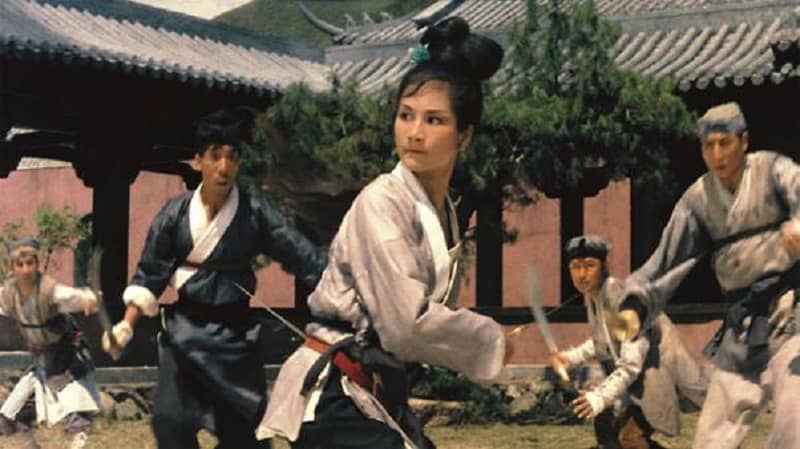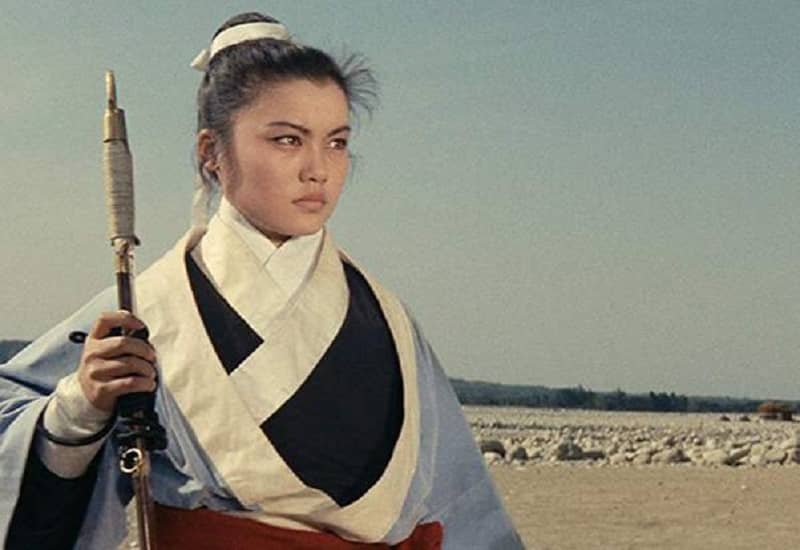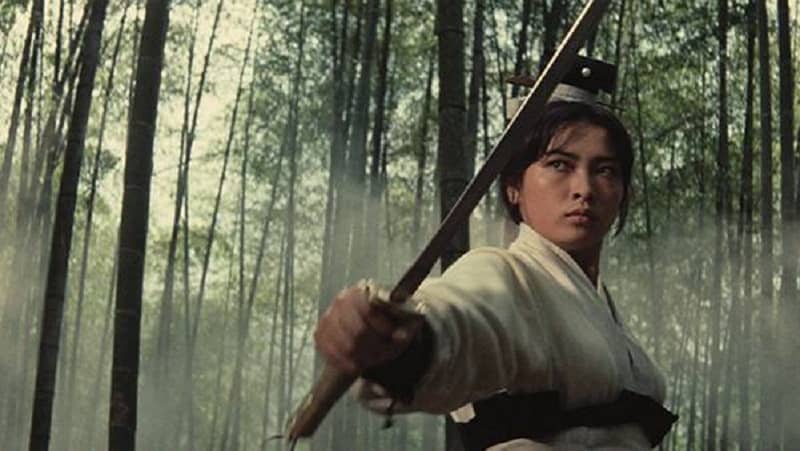Ellsworth’s Cinema of Swords: Hu’s On First
Come Drink With Me (Hong Kong, 1966)
Even if you’re not a big fan of wuxia, or Chinese historical martial arts films, you’ve certainly seen Crouching Tiger, Hidden Dragon, so you’re aware of their distinctive visual style. That style, of course, didn’t come out of nowhere, it developed over time, and can be traced back to the work of one man, writer-director King Hu, the creator of the modern wuxia movie. This week we’re looking at Hu’s first three hugely influential films, which established the tropes, look, and feel of the genre in the Asian cinema of the late Sixties.
Come Drink With Me
Rating: *****
Origin: Hong Kong, 1966
Director: King Hu
Source: 88 Films Blu-ray
Sometime during the Ming Dynasty, a government official commands a file of troops who are escorting wheeled cages bearing captive bandits to prison. Suddenly they’re stopped by a white-robed man with a petition, demanding the release of the leader of the Five Tigers criminal gang. The petition is refused, and the response of the Five Tigers is instant: the troops are slain in a bloody massacre and their commander, the son of the local governor, is captured as a hostage. What can the governor do but send the Golden Swallow to rescue him?
Come Drink With Me, written and directed by King Hu, is the beginning of the modern wuxia film — wuxia, which you can think of as “historical Chinese martial arts with weapons” if you like, though the term translates more accurately to “martial chivalry.” King Hu’s brilliant cinematic innovation was to ignore the actual practices of martial arts and replace them with the theatricality of Chinese opera, depicting combat through the choreography of dance. This triggered a visual revolution that changed how fighting was depicted in cinema, a watershed that created, over time, a new paradigm that has become a standard in both east and west.
Not only that, but while he was at it Hu smashed the gender barrier by casting a nineteen-year-old ballet dancer, Cheng Pei-pei, as one of his two protagonists, placing female fighters on the same footing as men without even bothering to explain it. And he did it in a film that was both strikingly beautiful and broke new ground in quick cuts and editing.
So this is hot stuff. Golden Swallow (Cheng Pei-pei) sets out to confront the Five Tigers and rescue the governor’s son, who is also her brother, venturing into the bandits’ territory in male guise. (It’s a wuxia genre convention that a woman dressed as a man is seen as male by everyone until her gender is conclusively revealed — and indeed, that’s an old swashbuckling standard in western cultures as well.) The Swallow’s first confrontation with the bandits is in a large restaurant perfect for a big brawl, but just as it gets going, a drunken beggar butts in on the fight, cracking jokes and getting in the way like countless clown characters before him since the beginning of theater. However, there’s a difference: this clown, Drunken Cat (the charming Yueh Hua), has superior kung fu abilities that he slyly and furtively deploys on the behalf of the badly outnumbered Golden Swallow.
The Swallow, stylish as hell, wins her initial combat with the Five Tigers’ goons thanks to the hidden help of Drunken Cat, exhibiting as she does remarkable skills that are still nonetheless believably within the possibilities of human athletics. However, when she tracks the Five Tigers to their lair and faces their Number Two, Jade Faced Tiger (Chan Hung-lit), the jams are kicked out and the combat begins to verge on the superhuman. Drunken Cat intervenes, changing the balance of power by revealing his true skills — but can even his powers match those of the supreme mastermind behind the Five Tigers, the wicked Abbot Liao Kung (Yeung Chi-hing)?
This movie was made for the Hong Kong studio of the Shaw Brothers, a film factory that had no patience for art, so after he finished it King Hu bid the Shaws farewell and went to Taiwan to make Dragon Inn. But Come Drink With Me, art and all, was such a success that even the Shaw Brothers recognized they had a new genre on their hands, following it up with Golden Swallow and dozens more movies well into the Eighties. And thus a new style of swashbuckler was born to the benefit of us all.
Dragon Inn (or Dragon Gate Inn)
Rating: ****
Origin: Taiwan, 1967
Director: King Hu
Source: Eureka! Blu-ray
Hu’s follow-up to his standard-setting Come Drink with Me, this film builds on the successes of its predecessor but is also quite different from it. Dragon Inn was an even bigger hit in Asia than Drink, and in some ways is even more influential.
At the beginning of the film there’s a major background story dump that you immediately forget because it really doesn’t matter. Set in 1457 during the Ming Dynasty during the reign of the emperor’s eunuch advisors, the great General Yu is framed for treason and executed because the eunuchs consider him a threat. His three children are exiled and sent on foot toward the distant western border with only a few guards, and the eunuchs, being thorough, send two companies of martial arts agents from the Eastern Group in pursuit to slay the kids once they’re sufficiently far from the capital. Summary: the government agents are bad.
A company of these agents under three capable officers ventures ahead to a desolate, rocky plain where the only food and hospitality available is at the lonely Dragon Inn. The agents barge in and take over the place, terrorizing the staff and showing how bad they are by murdering their hired porters instead of paying them. Now all they have to do is wait for General Yu’s children to arrive, slaughter them and their escorts, and Bob’s-your-uncle. But a smiling stranger with a folded parasol comes in through the door to the desert, and, ignoring every hint that he should leave or else, calmly sits down and orders noodles and a bottle of wine. Needless to say, the stranger, Xiao (Shih Chun), is a total martial arts badass, and the government agents have suddenly got trouble.
The central scene in Drink is when Golden Swallow intrudes on a city inn full of evil goons and, as the suspense rises, gradually reveals her considerable abilities. Dragon Inn perfects that scene and then turns it around and replays it in new variations, adding further wandering badasses to Xiao’s side and gradually increasing the number and level of enemies they face inside and outside the inn. Eventually the children and their escort arrive, closely followed by the bulk of the agents and their commander, General Zhao, reputedly the finest swordfighter in China, and things get desperate. The action only pauses long enough to introduce new badasses on both sides, and the fights expertly ratchet up in intensity until the final battle, which pits Xiao and all his new allies against the nigh-invincible General Zhao.
Where this film suffers in comparison to Come Drink with Me and Hu’s third film, A Touch of Zen, is that Dragon Inn has almost no time for characterization. The only characters who really stand out are the urbane and sardonic Xiao and the fierce Miss Zhu (Lingfeng Shangguan), who dominates her every scene. Once again, without explanation or justification, Hu presents a female warrior who can hold her own, and more, with the men. Where does she come from? Who cares? She’s tremendous. If you’re interested in the origin and development of the wuxia film genre, you need to see Dragon Inn.
A Touch of Zen
Rating: ****
Origin: Japan, 1971
Director: King Hu
Source: Mubi streaming video
This movie is writer-director King Hu’s statement that a wuxia film can have artistic significance without straying outside the bounds of the genre, a claim he pretty much makes good on. Originally released in two parts, this is a three-hour epic that takes its time developing its characters and telling its story. Fortunately, it’s time well spent.
During the Ming dynasty, in a remote village near a ruined fort, unambitious artist and calligrapher Gu Shengzai (Shih Chun) lives contentedly with his nagging mother amid a stack of ancient scrolls. But when two groups of strangers appear in town, furtively keeping an eye on each other, he is intrigued and investigates, becoming even more interested when he finds one of the strangers, Miss Yang (Hsu Feng), is an attractive young woman. But these strangers are dangerous folk, martial artists from opposing factions, and noncombatant Gu might be getting in over his head.
Almost everything is seen from the viewpoint of the scholarly artist, and a wuxia fan could be forgiven for wondering when the fighters are going to step forward as protagonists, sending the inoffensive calligrapher back to his brushes. However, though Yang Huizhen emerges as the most important of the martial arts characters, she never usurps Gu’s central role. Yang and her allies, renegade generals Shi (Bai Ying) and Lu (Xue Han), are on the run from the murderous Eastern Group, and Gu, smitten with the fiercely independent Yang, gets drawn into the fugitives’ affairs. The inoffensive artist, filled with purpose for the first time in his life, emerges as the band’s battle planner because he’s spent so many years studying the scrolls of the masters of strategy. And they’re going to need strategy, for the Eastern Group is sending General Men Da (Wang Rui) after them with a company of two hundred soldiers.
Gu plants a story that the fugitives are hiding in the ruined fort, starts a rumor spreading among the troops that the fort is haunted, and then devises tricks and traps that will panic the soldiers in the night and concentrate them where they can be slaughtered by multi-shot standing crossbows. It all works just as Gu had planned, and the morning after the battle he triumphantly surveys his clever tricks and fright devices, laughing delightedly at how effective they’d been, until he suddenly comes upon the killing field of dead soldiers and faces the true consequences of lethal violence. And where is Miss Yang? She’s disappeared! Grim-faced Buddhist monks arrive to clean up after the carnage, and though Gu begs them to tell him if they know where Miss Yang has gone, none will say. He will have to leave his village and search for her himself.
Though it’s almost an hour into the film before anyone draws a sword, there are plenty of classic wuxia combats in this movie, with all the exotic weapons, aerial leaps, and arrow-catching you could ask for, especially in the clashes between the steely Wang Huizhen and relentless Ouyang Nian (Tien Peng), the Eastern Group’s most dangerous agent. Buddhist themes gradually become more prominent as Abbot Hui (Roy Chiao) intervenes to give the fugitives protection at his Chan monastery, and once Gu goes on his search for Yang the story gets increasingly allegorical. (With a straight face, Abbot Hui utters lines like, “His evil is not yet expunged,” so you know he’s a serious dude.) In the last hour the story also leaves the small town’s sets and opens out into the gorgeous natural scenery of Taiwan, where Hu composes his shots like paintings on ancient triptychs. King Hu even finds a way to give the story a happy ending, though it’s just as unconventional as his lead characters. Epic!
Where can I watch these movies? I’m glad you asked! Many movies and TV shows are available on disk in DVD or Blu-ray formats, but nowadays we live in a new world of streaming services, more every month it seems. However, it can be hard to find what content will stream in your location, since the market is evolving and global services are a patchwork quilt of rights and availability. I recommend JustWatch.com, a search engine that scans streaming services to find the title of your choice. Give it a try. And if you have a better alternative, let us know.
The previous installments in the Cinema of Swords are:
Olivia de Havilland — First Queen of the Swashbucklers
Goofballs in Harem Pants
Disney’s Early Swashbucklers
‘50s Vikings – Havoc in Horned Helms
Laughing Cavaliers
Charming and Dangerous: Douglas Fairbanks, Jr.
Eleven Samurai: Early Chambara Classics
Beyond Captain Blood: Three by Sabatini
3 Musketeers + 1 Long Nose
Louis Hayward, Everyman with a Sword (Part 1 of 2)
Days of Technicolor Knights
Louis Hayward, Everyman with a Sword (Part 2 of 2)
Laurence Olivier, Swashbuckler?
Tony Curtis Goes Yonda
The 7th Voyage and Its Children
The Good, the Bad, and Mifune
The First British Invasion
Wholesome Buccaneers (Pt. 1)
The Tale of Zatoichi
The Sign of the Z!
Gallic Gallantry
Classic, Mythic and Epic
The Exuberant Excess of Sixties Vikings
Tyrone’s Typecast Troubles
Not-So-Wholesome Buccaneers
Daimajin Strikes Again!
Three Counts of Monte Cristo
Mongols, Cossacks, And Tartars
I Heard You Like Swords
Bard’s Tales
LAWRENCE ELLSWORTH is deep in his current mega-project, editing and translating new, contemporary English editions of all the works in Alexandre Dumas’s Musketeers Cycle, with the fifth volume, Between Two Kings, coming in July from Pegasus Books in the US and UK. His website is Swashbucklingadventure.net.
Ellsworth’s secret identity is game designer LAWRENCE SCHICK, who’s been designing role-playing games since the 1970s. He now lives in Dublin, Ireland, where he’s writing Dungeons & Dragons scenarios for Larian Studios’ Baldur’s Gate 3.



Another Cinema of Swords??? Wuxia!
I have heard of these films, but never seen them. I’m going to have to dig them out, they sound great.
Thanks for the recommendations, Mr. Ellsworth!
I saw Come Drink With Me twice. While I wasn’t quite as enthralled with it the second time around, it certainly was worth see once. One of my favorite lesser known Wuxia films is Avenging Eagle. It begins with two strangers meet in the desert and goes from there.
We’ll get to “Avenging Eagle,” Matthew!
Oh, good!
Really been enjoying the recent releases of his films. My favorites are probably Legend Of The Mountain and The Fate Of Lee Khan. I’m keeping my fingers crossed for Painted Skin, Valiant Ones and Swordsman.
And you can stream Come Drink With Me and A Touch of Zen for a couple of dollars on Amazon Prime.
[…] Ellsworth is the pen name of Lawrence Schick (seen below), who is also translator of Alexandre Dumas’s Musketeers Cycle from Pegasus Books. Early in his career, Schick was a writer on the team at TSR Hobbies that developed Dungeons & Dragons. He’s something of a role-playing game legend. An impetus for the new book is his popular web feature, Cinema of Swords, on his website, and on the site, Black Gate: Adventures in Fantasy Literature. […]